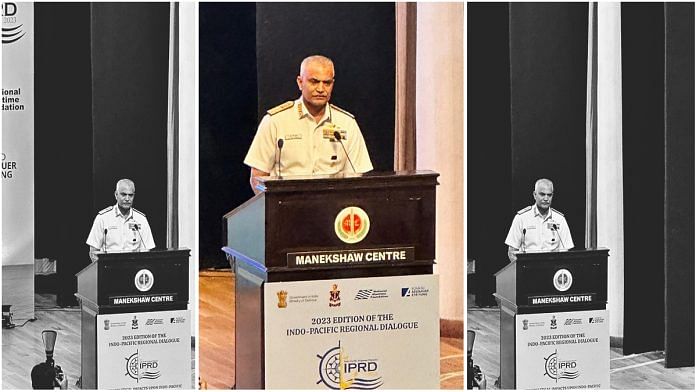New Delhi: In a veiled reference to Beijing’s aggression, Indian Navy chief Admiral R. Hari Kumar said Wednesday that “the fragile situation” in South China Sea along with violations of code of conduct poses a clear and present danger to good order and discipline at sea.
The Navy chief was referring to Beijing’s aggressive claims to most of the South China Sea as its sovereign territory within the nine-dash line.
“The fragile security situation in the South China Sea, in addition to the happenings of violations of established codes of conduct or confidence-building measures, poses a clear and present danger to good order and discipline at sea,” Admiral Kumar said in his commemorative address at the Navy’s annual international conference Indo-Pacific Regional Dialogue (IPRD).
The theme of the three-day seminar, which began in New Delhi from Wednesday, is ‘Geopolitical Impacts upon Indo-Pacific Maritime Trade and Connectivity’.
“For Bharat, it (Indo-Pacific) extends from the eastern shores of Africa to the western shores of America. For the US, it stretches from its Pacific Coastline to the Indian Ocean. But boundaries are not as important when it comes to defining the Indo-Pacific,” the Navy chief said.
He added that the region is the most militarised in the world and it further exacerbated the probability of ongoing competition coming from a conflict.
“More than 50 warships of extra-regional forces remain deployed in the Indian Ocean Region for various missions, including for anti-piracy patrol off the Gulf of Aden, and the wider Indo-Pacific also has significant naval presence.”
Owing to the increased presence of multinational forces and differing interpretations of international laws, he said, there is this fear that the region’s global commons can change to contested seas.
Admiral Kumar asserted that this contestation at sea can have adverse consequences for physical, social as well as economic security.
To put things in perspective, he cited two recent incidents which hampered trade and connectivity at sea.
“First, blockage of Suez Canal by MV Ever Given in 2021. Though it was not an outcome of military contestation or conflict, this incident is a stark reminder of how economic security could be threatened by a small incident,” he said.
The Suez Canal reduces the travel distance between Europe and Asia by nearly 6,500 km. It caters for 12 percent of global trade, allows transit of 1 million barrels of oil each day, and contributes to 2 percent of Egypt’s GDP.
He added that this six-day blockage resulted in about 450 ships waiting to transit the canal and causing an estimated economic loss of $60 billion to the global economy.
The second incident that Admiral Kumar referred to was the disruption of Black Sea shipping lanes during the ongoing conflict in Europe.
This conflict disturbed grain exports from Russia and Ukraine, which together provide 30 percent wheat, 75 percent sunflower oil and 20 percent maize of the world’s supply. It sparked global panic, particularly in North Africa and the Middle East.
While these were only disruptions, the Navy chief said, complete blockades could prove to put the region in a dire situation. He said that while these fissures would continue to exist, the seas would remain a “common binder” for the countries to work together.
Admiral Kumar also spoke about the need for nations to work in cohesion. “Given that resources will never be unlimited, it is virtually impossible for any single nation to ensure security and stability in the maritime domain by itself. The solutions, thus, lie in working through a cooperative or collaborative system, alongside like-minded maritime nations with a commonality and convergence of purpose. This, to my mind, is no longer merely desirable, but essential,” he explained.
The Chief of Naval Staff highlighted the three elements that the Indian Navy had prioritised to play a more “constructive role” towards ensuring maritime connectivity across the region.
The first is to “support harnessing of the multitude of competencies that are resident amongst each one of our navies”, he said. Second, he said, was “engaging partner nations to develop interoperability and trust”, while third was to “focus on the persistent problems faced by regional nations on a day-to-day basis”.
(Edited by Tony Rai)
Also Read: Israel-Hamas war potential challenge to India-Middle East-Europe Corridor, Sitharaman says



